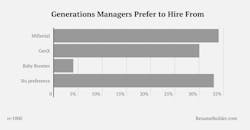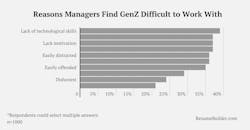The coming wave of people now making their initial foray into the workforce is from a cohort – Gen Z – that apparently has many employers scratching their heads and others fuming.
New research from Resume Builder, a job-search consulting firm, indicates hiring managers see Gen Z workers as particularly difficult to work with, leading to struggles to integrate them into their organizations and short engagements.
The findings may be notable given Gen Z’s size – some 86 million people born since 1996 – and the dependency employers will have on that group filling open positions in the future. And it could be especially pertinent to employers in industries like construction and career sectors like the skilled trades that are losing older workers at a fast clip while struggling to appeal to a younger generation.
In its survey of 1,000 managers and business leaders, Resume Builder found half report working with Gen Z difficult all or most of the time; 65% saying they’re quicker to fire Gen Zers than those in other cohorts; 27% reporting they’ve fired a Gen Zer within a month of starting; and one in three find Gen Z difficult and prefer to hire Millennials (Fig. 1).
Those surveyed say problems with Gen Z workers stem mostly from a lack of technological skills, motivation, and effort; about a third cited those as reasons they were “difficult” (Fig. 2). Top reasons cited for comparatively quick firings were lack of motivation/effort and extreme sensitivity to criticism or being “easily offended.”
Parsing the findings, Resume Builder executives, surveyed managers, and others theorize that COVID-19 and the remote education and isolating experience that ensued for many may have stunted the social and communications skills growth of Gen Z. That may be manifesting in confrontational attitudes, a lack of discipline, opposition to authority, and a general feeling of superiority and willingness to challenge rules and norms.
Another plausible theory for Gen Z’s attitudes suggested by the survey is that many may enter the adult workforce less grounded in the working world. A Pew Research survey on the generation in 2020 found evidence that fewer of those aged 15 to 17 held jobs compared with those of the same age in generations past. In 2018, just 18% of Gen Z teens were employed, compared with 27% of Millennial teens in 2002 and 41% of Gen Xers in 1986. Fewer older Gen Zers were working as well; 62% compared with 71% of Millennials and 79% of Gen Xers at that age.
But other research into Gen Z suggests all is not lost. Some studies posit that the shared traits and experiences that may make for a poor fit for the traditional work world might be valuable in an emerging work world of more flexibility and autonomy and less structure. And to the extent they crave that, more might also find their way into educational paths and careers that diverge from those of earlier generations.
That could bode well for construction contractors who are on track to struggle mightily to find enough workers to replace those leaving and meet future demand. While jobs in that field (including skilled trades such as electrical) largely haven’t shed their poor image, they may grow to find more appeal to Gen Z, which has had a front-row seat to the rising cost of college and the increasingly questionable value of a four-year degree. A recent survey by Black & Decker of students aged 14-19, their parents, and skilled trade workers found that 80% of the youths and their parents worry about funding college; a similar majority said that starting a career sooner than a four-year degree allows has appeal; and most see skilled trades as a good career option. Still, only about half say they’ve considered that career path, and just 16% say they’re likely to consider it.
But given Gen Z’s apparent leaning toward swimming against the tide, challenging norms, and desiring to carve something out for themselves earlier in life and in their own unique way, construction-related work generally (and the skilled trades in particular) could ultimately provide an answer — one that the industry would welcome with open arms, too.
Tom Zind is an independent analyst and freelance writer based in Lees Summit, Mo. He can be reached at [email protected].
About the Author
Tom Zind
Freelance Writer
Zind is a freelance writer based in Lee’s Summit, Mo. He can be reached at [email protected].


